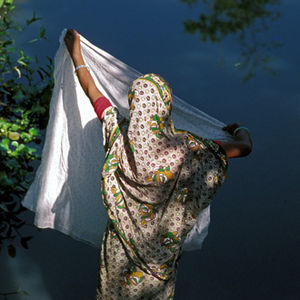
Problem being addressed[edit | edit source]
Bangladesh is a low-income country where groundwater is often contaminated with arsenic and frequent floods render surface water unsafe for drinking. People living in areas with limited access to safe drinking water require an inexpensive means of purifying water from disease-causing pathogens, such as Vibrio cholerae.
Detailed description of the solution[edit | edit source]
A traditional method of purifying water, women fold old sari fabric 4-8 times and filter water and homemade beverages through it. This is an essentially cost-free means of providing cleaner drinking water in areas at risk for cholera.
Concept[edit | edit source]
- Concept: Using a cloth/sari to filter water is a traditional technique in Bangladesh and is likely to be in place in other places including other African nations.
When and where it was tested/implemented[edit | edit source]
In a 2003 field study in Matlab, Bangladesh, Rita Colwell and her colleagues from the university of Maryland and John Hopkins demonstrated that by using the eight times folded cotton sari cloth as a filter for drinking water, there would be reduction in incidence of cholera. Also, women in India take advantage of this method to prevent cholera.
Funding Source[edit | edit source]
Research on this method of filtration was supported by National Institute of Nursing Research by the National Institutes of Health Grant RO1 NRO427-01A1.
References[edit | edit source]
Peer-reviewed publication[edit | edit source]
Colwell RR, Huq A, Islam MS, Aziz KMA, Yunus M, Khan NH, Mahmud A, Sack RB, Nair GB, Chakraborty J, Sack DA, and Russek-Cohen E. 2003. Reduction of cholera in Bangladeshi villages by simple filtration. PNAS 100:1051-1055. Link available here.
Huq A, Xu B, Chowdhury MA, Islam MS, Montilla R, and Colwell RR.1996. A simple filtration method to remove plankton-associated Vibrio cholerae in raw water supplies in developing countries. Applied and Environmental Epidemiology 62:2508-2512. Link available here.
Huq A, Yunus M, Sohel S, Bhuiya A, Emch M, Luby SP, Russek-Cohen E, Nair GB, Sack RB and Colwell RR. 2010. Simple sari cloth filtration of water is sustainable and continues to protect villagers from cholera in Matlab, Bangladesh. mBIO 1: e00034-10. Link available here.